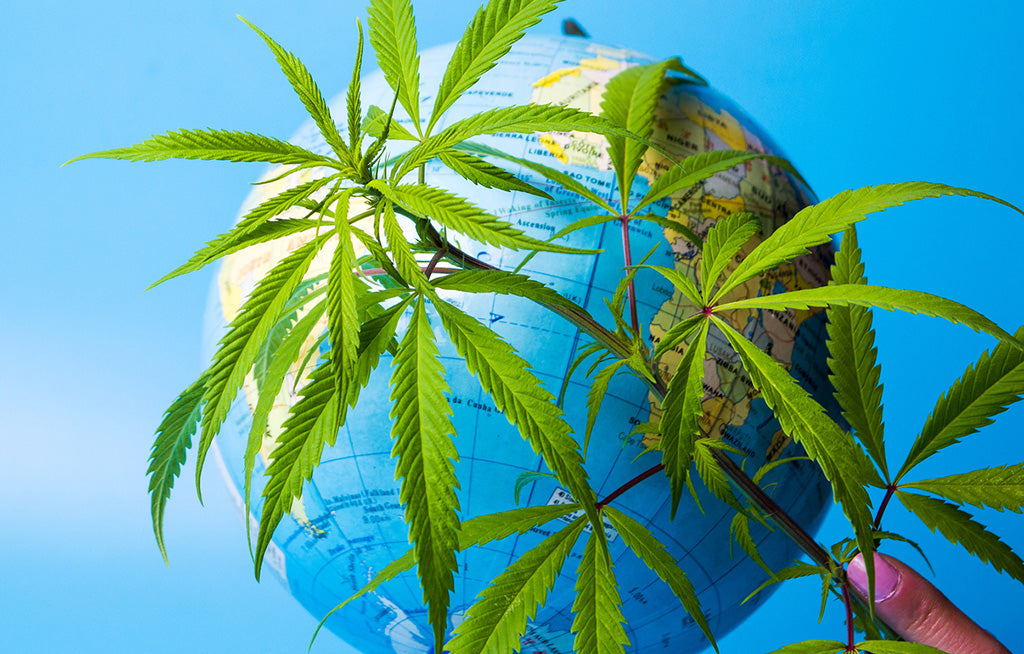
With a bill to legalize marijuana currently winding its way through the U.S. Congress as we approach Earth Day, the hemp farming industry is poised for a potential explosion. Nationwide legalization of cannabis will make it more profitable for farmers to grow hemp plants for a variety of other products, including CBD, should the measure pass. This is also great news for Mother Earth in light of the spectre of impending climate change, which affects food production, sea levels, biodiversity and weather patterns around the globe.
Much of Earth’s climate change is triggered by the emission of greenhouse gases from industries such as agriculture, electricity and heat production. Because of this, sustainable changes to industrial practices are needed to reduce the emission of greenhouse gases and slow down the negative effects of climate change.
Hemp is an ancient, eco-friendly crop that can be used in a variety of industries and help sustain our planet.
Hemp Production
The Agriculture Improvement Act of 2018 recently reclassified hemp separately from marijuana. This means that commercial production of industrial hemp is now allowed in the United States. Industrial hemp is a member of the plant species Cannabis sativa L.
Hemp is a non-intoxicating plant bred to be low in THC (the psychoactive chemical found in cannabis plants). All harvested parts of the hemp plant are useful, including the seeds, fibers, oil and leaves.
Reduces Agricultural Inputs
Hemp farming provides a number of benefits to our environment. Industrial hemp may reduce the need for herbicide and pesticide use. While not immune to pests, hemp tends to be more resistant to crop pests when compared with other fiber crops like cotton.
Herbicide use is also lower in industrial hemp crop production due to its rapid growth and high planting density, which crowds out weeds. Reduction in chemical use protects biodiversity and the quality of our water supply by decreasing the likelihood of crop runoff. The hemp plant may also be beneficial in protecting topsoil and improving soil quality for crop rotation.
Hemp's contributions to climate change are lower when compared with traditional fossil fuels.
Reduces Fossil Fuel Dependency
Fossil fuels are a limited resource and a major contributor to global warming. Fossil fuel extraction, as well as the burning of carbon-based fuels, leads to higher concentrations of carbon in the atmosphere. Hemp oil can be used as an alternative, renewable fuel source to power engines for transportation. As a biomass, its contributions to climate change are lower when compared with traditional fossil fuels.
Provides Health and Beauty Products
Hemp seeds are a nutritious food. Hemp contains protein and healthy omega-3 fatty acids. It also contains vitamins and minerals like phosphorus, potassium, B-vitamins, iron and magnesium. The oil from industrial hemp seeds can be used in cooking and as a natural oil for soaps, shampoos, bath gels and other cosmetics.
Reduces Deforestation
Hemp is effective as a replacement for wood-based products and construction materials due to its longevity, strength and durability. Pulp made from hemp fibers can be used for all types of paper production, including cardboard and packaging materials.
Hemp is also a suitable alternative for common building supplies such as fiberglass, fiberboards, stucco and concrete (known as HempCrete). Hemp as a wood alternative can reduce the rate of deforestation, which expedites climate change and endangers the biodiversity of our planet. It is also more easily regrown than trees and is recyclable, helping to decrease waste.
Provides Alternatives For Cloth Production
Hemp is an eco-friendly alternative to cotton and petroleum-based synthetic textiles. It requires less agricultural inputs like water and pesticides, and has a higher yield per acre than cotton. Hemp is also a strong fiber that creates quality textiles. Hemp fabrics tend to be more absorbent, durable and insulating than cotton.
With its multitude of uses and smaller environmental footprint, hemp is arguably one of our most valuable resources in the global movement to reverse climate change.









